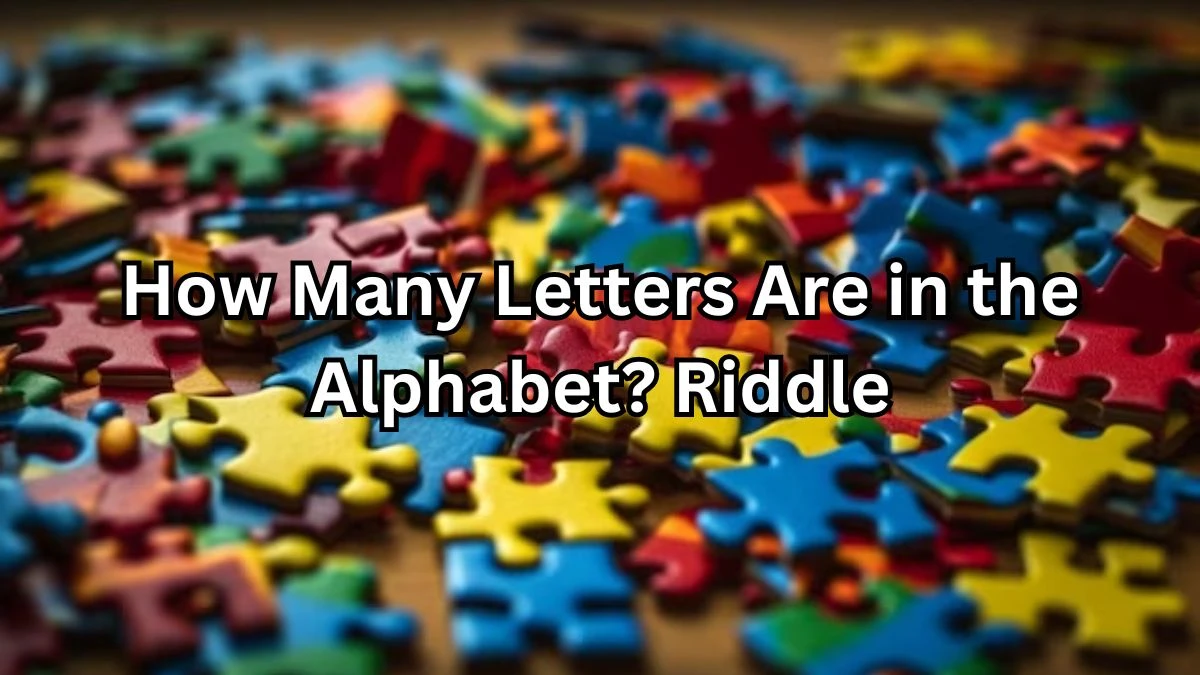- Rojgarlive »
- Riddle »
- How Many Letters Are in the Alphabet? Riddle and Answer
How Many Letters Are in the Alphabet? Riddle and Answer
by S Samayanka
Updated Feb 10, 2024

How Many Letters Are in the Alphabet? Riddle
The riddle "How Many Letters Are in the Alphabet?" is a playful question that appears straightforward but requires critical thinking to answer. At first glance, one might count the letters in the word "alphabet" and conclude there are 8 or 26 letters, representing the English alphabet. However, the riddle's twist lies in its wording.
The answer isn't a number but a reflection on the structure of the question itself. By considering that the question asks "how many letters are in the alphabet," it prompts one to think beyond the literal interpretation. This riddle demonstrates the importance of careful reading and thinking outside the box to decipher its true meaning.
Riddle: How Many Letters Are in the Alphabet?
How Many Letters Are in the Alphabet? Riddle Answer
The riddle "How Many Letters Are in the Alphabet?" seems straightforward, but its answer lies in the wording. The solution is 11, not because of the number of letters in the word "alphabet," but because of the phrase "the alphabet." This phrase contains 11 letters: three in "the" and eight in "alphabet." So, the riddle isn't about counting the letters in the alphabet itself but in the specific phrase referring to it.
This riddle teaches us to pay attention to details and think creatively when solving puzzles. It emphasizes the importance of interpreting language precisely and considering alternative perspectives. By unraveling the hidden meaning behind the question, we learn the value of critical thinking and careful analysis in problem-solving situations.
Answer: 11
What is Riddle?
A riddle is a form of enigmatic expression that challenges the intellect and encourages creative thinking. It typically presents a puzzling question or problem, often in a metaphorical or allegorical manner, with the goal of teasing out a clever and unexpected answer.
Riddles have been an integral part of human cultures throughout history, serving as a source of entertainment, mental stimulation, and sometimes even educational tools. They exist in various forms, from verbal puzzles to written or visual conundrums. Riddles often require lateral thinking, as they demand individuals to approach problems from unconventional angles to arrive at a solution.
In essence, a riddle is a playful and imaginative exercise that invites individuals to engage their cognitive abilities, fostering a sense of curiosity and the joy of unraveling mysteries. Whether used for amusement, social interaction, or intellectual development, riddles endure as timeless expressions of human ingenuity and the universal desire for mental challenges.
Benefits of Solving Riddle
- Mental Exercise: Engaging with riddles provides a mental workout, enhancing cognitive abilities and boosting critical thinking and problem-solving skills.
- Language Development: Riddles, often filled with wordplay and clever language usage, contribute to the enrichment of vocabulary. Regular exposure improves linguistic creativity and proficiency.
- Cultivation of Creativity: The process of unraveling riddles encourages thinking outside conventional boundaries, fostering creativity and imaginative thinking.
- Entertainment and Social Interaction: Solving riddles is an enjoyable activity, offering entertainment and amusement. It can be a social experience, promoting interaction and friendly competition.
- Educational Insights: Riddles often convey cultural or historical insights, serving as a playful means to learn about language, traditions, and societal aspects. They can be incorporated into educational settings for engaging learning.
- Confidence Building: Successfully solving challenging riddles instills a sense of accomplishment, boosting self-confidence, and encouraging perseverance when faced with mental challenges.
- Memory Enhancement: Recalling information from riddles contributes to memory improvement. The mental effort involved in solving them strengthens memory retention.
- Logical Reasoning Development: Riddles typically follow a logical structure, guiding individuals through a sequence of thoughts or deductions. This aids in the development of logical reasoning skills.
How Many Letters Are in the Alphabet? Riddle - FAQs
A riddle is a puzzling question or problem that challenges intellect and encourages creative thinking, often with an unexpected answer.
There are 11 letters: three in "the" and eight in "alphabet."
It teaches us to pay attention to details, think creatively, and interpret language precisely when solving puzzles.
Benefits include mental exercise, language development, cultivation of creativity, entertainment, educational insights, confidence building, memory enhancement, and logical reasoning development.
Riddles challenge individuals to engage their cognitive abilities, fostering curiosity, imagination, and the joy of unraveling mysteries, contributing to their enduring appeal.




